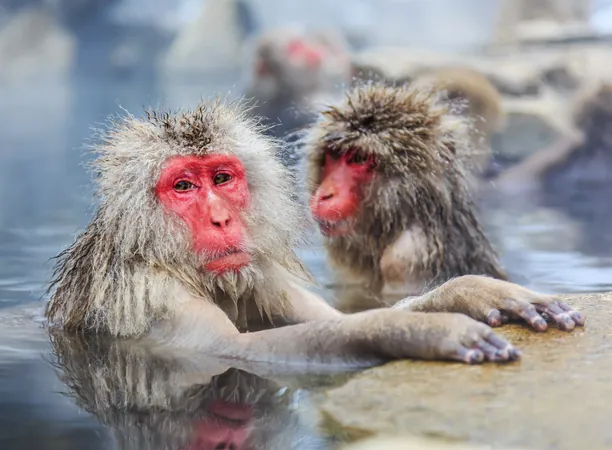
Unlocking the Secrets of Animal Culture: A Groundbreaking Database Reveals Their Hidden Traditions
2025-06-26
Author: Rajesh
A New Wave in Animal Research
Have you ever wondered how animals communicate within their own societies? A game-changing study shows that elephants, separated by just a few hundred miles, have distinct ways of rumbling to each other that may complicate their social interactions. This revelation is part of a broader understanding: many species have local traditions—fascinating behaviors that resemble human culture.
Introducing the Animal Culture Database
In an ambitious effort, researchers at the University of Arizona have launched the first-ever open-access global catalog dedicated to animal cultures. The Animal Culture Database compiles hundreds of peer-reviewed studies on socially learned behaviors, capturing everything from migratory routes in whales to the stone-tool techniques of chimpanzees.
Kiran Basava, the paper's lead author, emphasizes the importance of understanding these cultural traditions. "Our goal is to spark new discussions and research around how culture varies among different species and how animals adapt to human-induced changes in their environments," Basava states.
Exploring Cultures Around the World
This interactive database features a world map with clickable markers providing insight into diverse behaviors—like how orangutans build nests in Borneo, diverse whale songs in Tonga, or clever urban crows dropping nuts at traffic signals.
Users can filter by species, behaviors, or even geographical regions, revealing intriguing cases such as European rats using innovative techniques to peel pinecones or birds adjusting their mating dances in response to habitat changes caused by wildfires.
A Living Archive of Knowledge
To create this incredible resource, Basava and his team reviewed thousands of academic articles, coding 121 studies focused on mammals, birds, and even an insect species. With plans to expand to 600 more studies, they'll soon allow researchers to contribute their own findings.
Co-author Cristian Román-Palacios suggests that this tool could revolutionize our understanding of cultural evolution: "By studying these behaviors, we can trace cultural differences across species, transforming our insights into how culture influences survival across the animal kingdom."
Why It Matters: Cultural Loss and Extinction Risk
Understanding animal culture is crucial for conservation. Key traditions such as dialects, migration routes, and complex social signals are vital for the survival of species. Unfortunately, threats like habitat destruction, noise pollution, and climate change may erase these essential behaviors, making restoration efforts less effective if animals can't communicate.
The database aims to highlight and protect culturally important behaviors that could be as crucial as genetics to a species’ survival, much like humanity’s own cultural heritage.
From Science to Global Awareness
Experts believe the Animal Culture Database can be an educational goldmine, fostering a better understanding of evolutionary biology and animal sociology. Future updates may include multimedia features, like audio clips and videos of animal behavior, creating a vibrant atlas of animal cultures.
With plans for multilingual support, the database seeks to attract contributions from global researchers, including Indigenous knowledge-holders whose insights could significantly enrich our understanding.
Culture is Universal: Animals Need Their Voices Heard
This groundbreaking project marks a significant shift in how we perceive culture—not just as a human experience, but as a complex tapestry woven throughout the animal kingdom. From dolphins with signature whistles to capuchin monkeys with local grooming customs, social learning is prevalent.
Ultimately, the Animal Culture Database opens up a world of discovery, showcasing that culture extends beyond humans and giving us vital insights into the intricate lives of the animals we share this planet with. For now, anyone with internet access can explore these rich animal traditions, reminding us of our shared responsibility to protect the delicate cultures of our planet's wildlife.
Published in the journal Nature Scientific Data, this innovative study highlights the pressing need for conservation efforts that consider not only where animals live but how they thrive.


 Brasil (PT)
Brasil (PT)
 Canada (EN)
Canada (EN)
 Chile (ES)
Chile (ES)
 Česko (CS)
Česko (CS)
 대한민국 (KO)
대한민국 (KO)
 España (ES)
España (ES)
 France (FR)
France (FR)
 Hong Kong (EN)
Hong Kong (EN)
 Italia (IT)
Italia (IT)
 日本 (JA)
日本 (JA)
 Magyarország (HU)
Magyarország (HU)
 Norge (NO)
Norge (NO)
 Polska (PL)
Polska (PL)
 Schweiz (DE)
Schweiz (DE)
 Singapore (EN)
Singapore (EN)
 Sverige (SV)
Sverige (SV)
 Suomi (FI)
Suomi (FI)
 Türkiye (TR)
Türkiye (TR)
 الإمارات العربية المتحدة (AR)
الإمارات العربية المتحدة (AR)